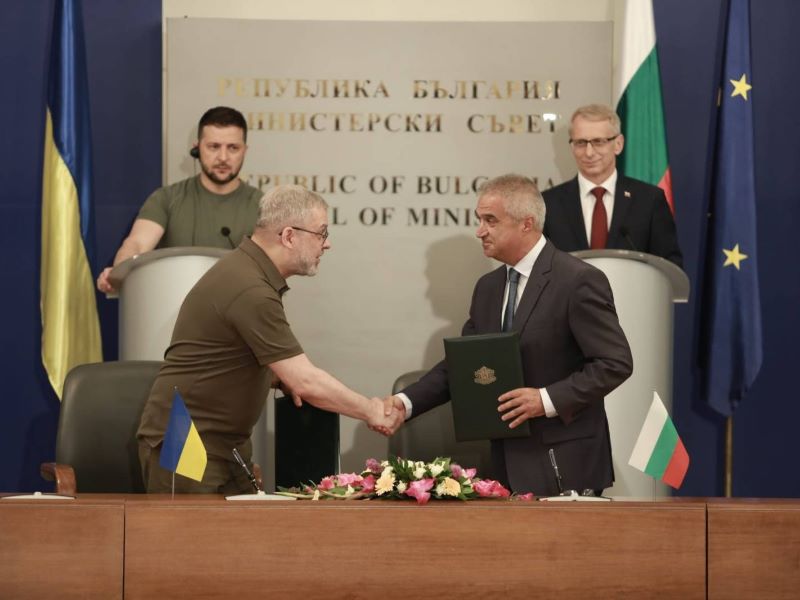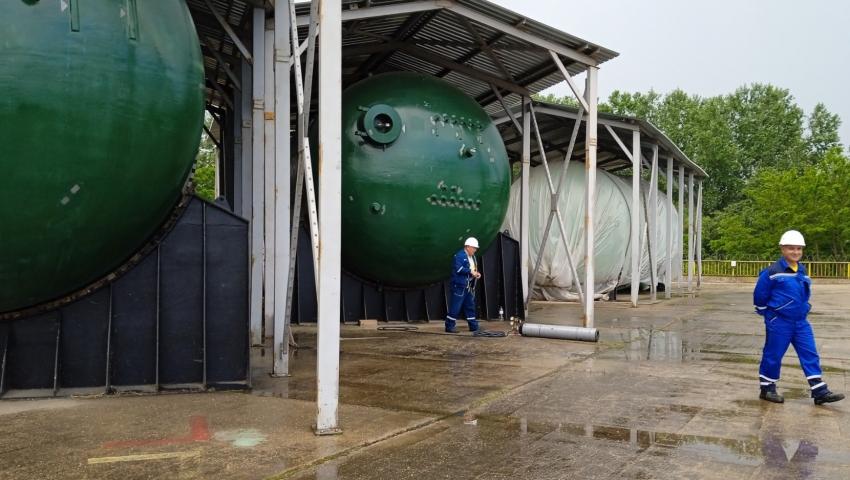 Bulgarian Energy Minister Rumen Radev and Ukrainian Energy Minister Herman Halushchenko signed a memorandum of understanding (MOU) on cooperation in the field of energy during Ukrainian President Volodymyr Zelensky’s visit to Sofia. The two ministers noted that the MOU aims at broad development of energy cooperation “to support the economic and infrastructural development of the whole region”. The MOU provides for cooperation in nuclear energy, gas, green energy and energy transition including smart networks.
Bulgarian Energy Minister Rumen Radev and Ukrainian Energy Minister Herman Halushchenko signed a memorandum of understanding (MOU) on cooperation in the field of energy during Ukrainian President Volodymyr Zelensky’s visit to Sofia. The two ministers noted that the MOU aims at broad development of energy cooperation “to support the economic and infrastructural development of the whole region”. The MOU provides for cooperation in nuclear energy, gas, green energy and energy transition including smart networks.
The two sides will exchange scientific, technical, engineering and operational experience, stimulate cooperation between energy companies and relevant institutions in both countries. Ukraine also expressed interested in the possibilities for delivery of liquefied natural gas through Bulgaria and its storage, as well as in increasing the capacity of electricity connectivity and opportunities for trade.
Ukraine's Energy Ministry said: "The parties will intensify the provision of expert and engineering services and solutions in the field of nuclear energy by conducting independent expertise on the assessment of the safety of nuclear facilities and exchange of experts, access to infrastructure and participation in joint projects and initiatives involving joint activities in the field of nuclear energy." Both sides will promote "cooperation at all stages of the nuclear fuel cycle, the implementation of activities and the provision of services related to the extension of the operational life of nuclear facilities, with the aim of increasing safety and/or improving their operational characteristics".
The MOU would also lead to the "exchange of knowledge and experience regarding the protection of energy infrastructure from physical, electromagnetic and cyber threats is also identified as a priority in cooperation".
A working group was set up, which held its first meeting the following day led by the two ministers accompanies by experts and representatives of energy companies from both countries. The meeting saw the start of negotiations on the possible sale to Ukraine of equipment manufactured for Bulgaria’s aborted Belene NPP, in accordance with a decision adopted that day by the Bulgarian National Assembly.
The Belene project envisaged the construction of two Russian VVER-1000/V-466 reactors and preliminary site works began in 2008 with the support of the government led by the Bulgarian Socialist Party (BSP). Contracts for components including large forgings and I&C systems were signed with suppliers. The plant was to be built by Atomstroyexport (part of Rosatom) after Russia won an international tender in 2006 but the project was cancelled in 2012, after a change of government. It was revived, again, in 2018 after a series of arbitration procedures, which saw Bulgaria pay €601.6 million ($691.5m) in compensation to Atomstroyexport for the equipment already manufactured. These components are now stored at the construction site and were also considered for use in expanding the Kozloduy NPP.
However, in June US-based Westinghouse Electric Company signed a Front-End Engineering & Design (FEED) contract with Kozloduy NPP-Newbuild for a AP1000 reactor to be constructed at the Kozloduy NPP site. Westinghouse said work was starting to assess Bulgarian industry and existing infrastructure at the Kozloduy site for its potential to host an AP1000 reactor.
The issue had been rushed through parliament in anticipation of Zelensky’s visit. The decision, which effectively ends any hopes of reviving the Belene project, was adopted by 155 votes to 57 with opposition coming from the BSP and its allies. Ukraine had requested in March that Bulgaria should hand over the equipment. The decision said the price sought from a possible sale of the equipment to Ukraine should not be less than the €601.6m paid in compensation to Russia in 2016.
The decision specified a deadline of 60 days for the transaction to be completed, although the sale process is likely to take months due to purely technical details. Bulgaria is expected to receive at least $1.2bn. Even if Ukraine does not want to buy all the equipment currently stored on site in Moscow, Kiev will have to pay the entire amount.
The negotiations will continue in different formats within a work schedule based on the time limits set by the decision of the Bulgarian Parliament. Bulgaria’s Energy Ministry noted: “Bulgaria has partially supplied equipment, which is not enough to build a whole new capacity. The dynamics in the energy sector is such that Bulgaria cannot afford to engage in a long, expensive and vague project. It must move quickly in line with the common European energy market and invest in realisable new alternative capacity. Ukraine has a serious interest in Bulgarian equipment, which it needs to compensate for lost energy capacity, including due to the temporary occupation of the nuclear Zaporizhia NPP.”
Halushchenko said the working group meeting was an important step in renewing relations between the countries in energy and a step towards realising the potential of bilateral cooperation. “Our meeting opens a new page of cooperation in the field of energy, especially nuclear and, in the future, renewable. I am convinced that we will soon demonstrate the effective and fruitful interaction of our countries,” he noted.
Bulgaria’s Prime Minister Nikolay Denkov said during a joint press conference with Zelenskyi in Sofia that “many technical, financial and economic” aspects of the proposed reactor equipment deal remain to be discussed. “This is only the beginning of negotiations”, he noted.
To make the purchase easier for Ukraine, the EU Commission announced that the potential deal could be financed with money the EU is already sending to Kyiv. “Ukraine can use EU funds to buy nuclear reactors from Bulgaria, as this would help strengthen the Ukrainian economy”, Commission spokesman Eric Mamer said. This year, the EU is providing Ukraine with financial assistance worth €1.5bn a month. “There is no obstacle for Ukraine to use part of the money for cooperation with Bulgaria in the field of nuclear energy,” he added.
Images: Top left – Bulgaria's Minister of Energy, Rumen Radev (R), and Ukraine's Minister of Energy, German Galushchenko (L) have signed a Memorandum of Understanding on cooperation in the field of energy (courtesy of Bulgarian Ministry of Energy); Bottom right – Reactor equipment stored at the Belene NPP site






